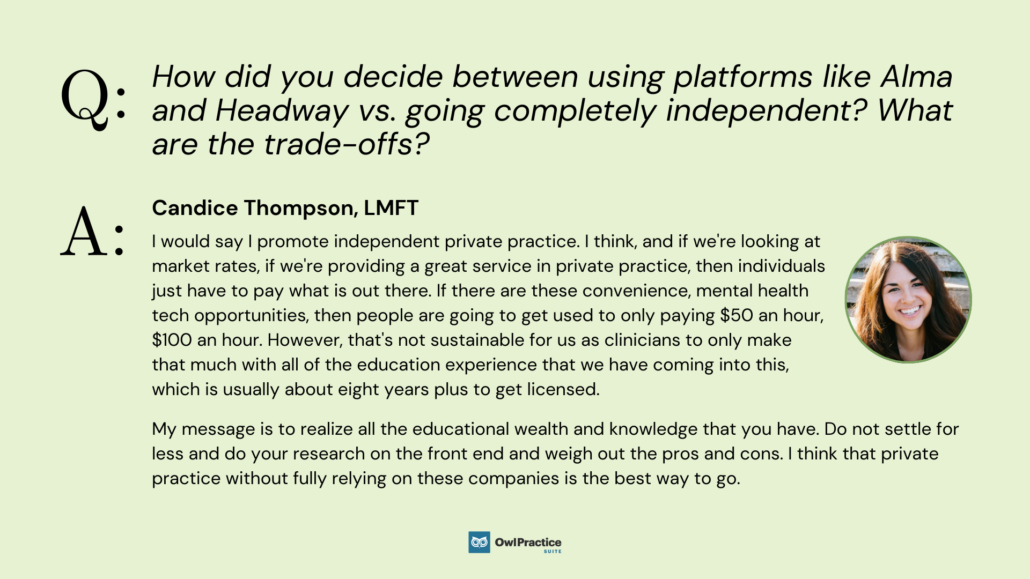
How did you decide between using platforms like Alma and Headway vs. going completely independent? What are the trade-offs?
Candice: Yes, so this is a topic I am very passionate about, and I think most of my LinkedIn — and probably Megan’s — is focused on these companies and the whole process. Before these companies were created, I started my private practice. It just wasn’t an option. Some of the ways that I built up my clientele, one is to, and this is just a piece of advice, like the things that I already do or the identities that I am affiliated with. So like I am a Christian, and so I got affiliated with a Christian counseling center, and that was a great way to find referrals.
Then Psychology Today, building relationships, it takes time on the front end, but trying to have a lot of different marketing streams. That has worked really, really well for me, and I’ve had a successful practice and now have been solely in a practice for the last six or seven years without an additional income stream. When these mental health tech platforms came online and promised to do all this work for me and give me $100 less and they’ll keep that $100 for themselves, I thought this is completely unreasonable and ridiculous.
However, this field is very cyclical, and you go through times where you feel like I’m not going to have a practice. For me, it’s usually around September when people go to school, have transitions in life, or right now in the holidays, people drop off. Sometimes you have a panic moment of, am I going to have clients, is this going to be sustainable? That happens probably about once a year for me. During that time, about a year ago, I started to look into some of these companies, like, okay, what are they offering? Is this the new wave?
I was fairly shocked at how abysmal the offerings were from a lot of companies. I first checked out BetterHelp because there’s all this marketing, and I just wanted to know, what does BetterHelp actually offer? What they wanted to reimburse me was $40 an hour, which was just like such a no-go right off the bat. My full fee is $220. I’m in the Silicon Valley, so that might be on the higher scale for most people, and I have 15 years of experience. $40 is absolutely nothing. I wasn’t impressed by any of the process that I had with them.
The number I called to talk with someone was clearly reading from a script and not some professional, and had no clinical experience. That turned me off. I talked to Alma, I had email exchanges with Headway, and a lot of them, again, they promise a lot and no judgment if you choose to take them. I think for earlier clinicians, it can provide some of that security and experience. For me, I just felt like, again, someone’s putting their hand in my cookie jar, and I could do some of that stuff. I already figured it out along the way.
However, I did chat with Spring, and I liked Spring Health. They reimbursed me $150 per client, which when I am in that panic mode will take happily, but I’ve only ever taken two clients from them because I, in a whole year, haven’t needed to take any more. I’ve really enjoyed that experience. I get to choose as needed. Again, that’s the highest payback that I’ve found from any of the other companies after doing all of my research there.
I would say I promote independent private practice. I think, and if we’re looking at market rates, if we’re providing a great service in private practice, then individuals just have to pay what is out there. If there are these convenience, mental health tech opportunities, then people are going to get used to only paying $50 an hour, $100 an hour. However, that’s not sustainable for us as clinicians to only make that much with all of the education experience that we have coming into this, which is usually about eight years plus to get licensed.
My message is to realize all the educational wealth and knowledge that you have. Do not settle for less and do your research on the front end and weigh out the pros and cons. I think that private practice without fully relying on these companies is the best way to go.

Megan: Also I want to throw out there that your mileage may vary. These rates, they are super different across states, across companies, make sure that you have it in writing and make sure you’re prepared for it to change even if you do have it in writing. Denise, could you weigh in on this as well?
Denise: I’m so blown away by all Candice’s due diligence. Thank you, Candice, for checking out all those companies. I had only checked out one, and that was enough. I, like you, said, “Oh, no, that’s not sustainable.” It doesn’t feel like it validates all, as you said, the education, the blood, sweat, and tears that we put into our expertise.
For me, in answering this question, though, I would say the most important thing for me was determining, is my private practice going to be full time or part time? I feel like that’s a very important starting point. It can be your starting point if you’re still in contemplative mode and figuring out, where do I go next? The reason for that is, I am part time, so I’m really trying to hold steady with about five to seven patients, no more than ten or it pushes me over the edge because I do have a full time day job. I’m always trying to find that sweet spot, the five to seven patients per week.
I only do self pay because if I was on one of these platforms, as Candice said, it just wouldn’t be worth my time commitment because I’m only really spending like six hours a week trying to have this private practice and be sustainable. I think if I was full time, rather than join one of these platforms, I probably would join an insurance panel instead. The reason for that is I don’t take insurance as well because, again, I’m part time. I’m just looking at six hours to make income, to help folks in a really meaningful way.
For me, it’s all self pay, no panels, no platforms. However, if I was full time, you think about it, most patients, if they are professional, right, and they are working that nine to five window, you’re going to have a lot of downtime during the day, during like the pre, let’s say, four to seven windows. In that time slot, maybe a panel would help supplement what you would hope to get as private pay in your afternoons and evenings. I think for me, I would probably go for an insurance panel if I was full time and not one of these platforms, simply just because I don’t think they validate our help and expertise as much as they should.
Read more about the panelists and where to follow them here: Power to the Private Practice: Finding Your Best Path to Private Practice.
Read Part 4 and more below:
- Part 1: What are three things you wish you could tell yourself in the year before you started your private practice?
- Part 2: Let’s talk about insurance vs. private pay — how did you decide, and what tools or information helped you make that decision?
- Part 4: How do you…pay taxes? Do market research? Brand yourself? Stay on top of bookkeeping?
- Part 5: How do you continue to stay informed and have a support network to help answer questions and navigate private practice after you are up and running?
- Part 6: Webinar Attendee Submitted Questions, and General Q&A

Start a Free Trial!
Reduce clinical administrative tasks and transform more lives with Owl Practice. Owl Practice provides all the tools you need to make your practice successful. Join the thousands of care professionals using Owl to run their practice every day.



